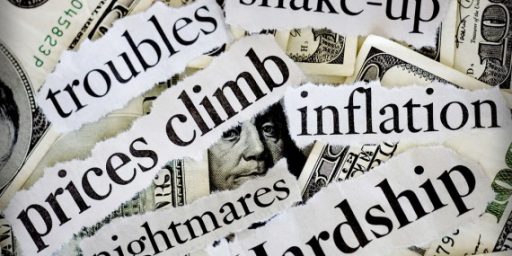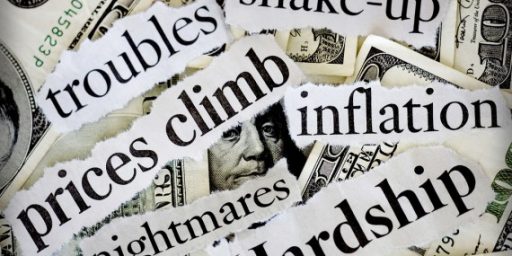Dow Plunges 387 Points on Subprime Fears
The Dow fell 387 points today amid mounting fears in regards to subprime loans in the housing market.
Wall Street plunged again Thursday after a French bank said it was freezing three funds that invested in U.S. subprime mortgages because it was unable to properly value their assets. The Dow Jones industrials extended its series of triple-digit swings, this time falling more than 380 points.
The announcement by BNP Paribas raised the specter of a widening impact of U.S. credit market problems. The idea that anyone — institutions, investors, companies, individuals — can’t get money when they need it unnerved a stock market that has suffered through weeks of volatility triggered by concerns about tight credit and bad subprime mortgages.
Update: More here,
In an unprecedented move yesterday, the European Central bank poured a record 94.8 billion euros (HK$1.02 trillion) into the markets, with the US central bank also injecting capital as banks gasped for liquidity.
The move came in the aftermath of France’s largest listed bank BNP Paribas shutting the door on withdrawals of funds worth 1.6 billion euros, tied to subprime securities. Rattled by the chill winds of subprime blowouts, BNP Paribas said it can not provide a fair value of the holdings of the funds, regardless of their quality or credit rating.
Credit issues spilled deeper into the European markets, engulfing more of the continent’s banks, and concerns grew that losses could multiply.
BNP’s woes and ECB’s firefighting move sparked a sell-off in all major European markets sending Europe’s Dow Jones Stoxx 600 Index down as much as 2.48 percent. The US market was also pressured with the Dow Jones Industrial Average falling as much as 1.77 percent in early trading.
The US Federal Reserve injected US$24 billion (HK$187.2 billion) in temporary reserves to the US banking system as there was spillover demand for funds from the European market.
And more here as well,
The European Central Bank stunned markets on Thursday with its aggressive intervention to quash a brewing liquidity crisis in European financial markets.
The ECB move far exceeded in scale and scope the relatively modest steps taken by the Federal Reserve to sustain adequate liquidity in US markets.
After noting a sharp rise in overnight interest rates to 4.7 per cent — far above the target 4 per cent — the ECB put out a statement in the morning saying it stood “ready to assure orderly conditions in the euro money market”.
Within a couple of hours it acted: taking the unprecedented step of offering a pre-announced unlimited tender so that European banks could get as much cash as they wanted.
The last time it stepped in to provide large-scale liquidity in response to market concerns was in the aftermath of the September 11 terrorist attacks. But even then, it did not offer unlimited support.
Interestingly, back in late July, Prof. James Hamilton updated his recession probability index and the numbers may be a bit surprising to some,
With the just-released 2007:Q2 data, we are in a position to make the call for 2007:Q1. The growth rate for that quarter is now reported to have been 0.6%, and it followed a string of weak growth rates in 2006. As a result, the value of the recession probability index for 2007:Q1 turns out to be 26.2%, its highest value since 2001:Q4. Note that this inference does make use of the strong 2007:Q2 advance estimates– had 2007:Q2 growth been weaker, the inference for 2007:Q1 would have been even more pessimistic. All of which is a reminder that the latest GDP numbers do not prove that we’re out of the woods yet.
No, were are definitely not out of the woods yet.
Another Update: An article on the problems with the subprime mortgage market.
The nation’s mortgage-lending industry is in such bad shape that tremors are shaking Wall Street. A record number of mortgages were foreclosed in the first quarter of this year.
Some of the nation’s biggest mortgage lenders have gone belly up, including one whose bankruptcy Monday wiped out $1.4 billion in assets. Two mortgage- related hedge funds at the big Wall Street securities firm Bear Stearns failed, causing investors to lose $1 billion.
Analysts and investors worry that the mortgage crisis will spread to the larger economy, tipping the nation into recession. Presidents and presidential candidates have taken notice.
[…]
But more than anything else, the current crisis can be attributed to the essential foolishness of lending money to people who aren’t likely to pay it back.
A booming market in so-called “subprime” mortgages has collapsed. Subprime loans are those made to customers whose credit is too poor to qualify for traditional loans.
The amount of subprime loans rose from $160 billion in 2001 to more than $600 billion in both 2005 and 2006. Some lenders even issued “no-doc” loans, requiring no documentation of income at all.
Update III: Another thing to factor into all of this is the weak job numbers that have been coming out. 60,000 new jobs for July is…well paltry. And while June was much better (by comparison), it is still off from what historically is seen with a growing economy.






It should be noted that there is a differentiated value for subprime or stated income loans in the commercial lending market. This loan type is not entirely bad despite the abuse of some in the residential lending arena. Oftentimes, individuals that want to start or acquire a small business, purchase a gas station, acquire a motel, open an auto repair shop or any of a myriad of sole proprietor establishements, and do not have the portfolio that would make them attractive to the big box leaders. Lending companies like Ocean Capital in Rhode Island offer subprime and stated income loans by using up close and personal evaluations of the borrower and the opportunity. We need companies like this to support new business opportunities.
it should also be suggested that with the Dow what the stratospheric levels and has been for the last few years, that a three or 400 point jump or drop is perhaps not as significant as it would be were the Dow at sub-10,000 levels. On a percentage basis a 400 point swing today is far less significant than it would have been years ago. Thereby, trying to attribute all kinds of gloom and doom to a simple case of profit taking is inaccurate at least and quite possibly self serving on the part of some.
Additionally, the financial sector is a larger proportion of the economy than it was years ago (at least in dollars). One of the things that means is that the Dow is less attached to the underlying economy than it used to be. Sometimes the Dow goes up and down because if it didn’t go up and down a lot of financial sector people wouldn’t make any money.